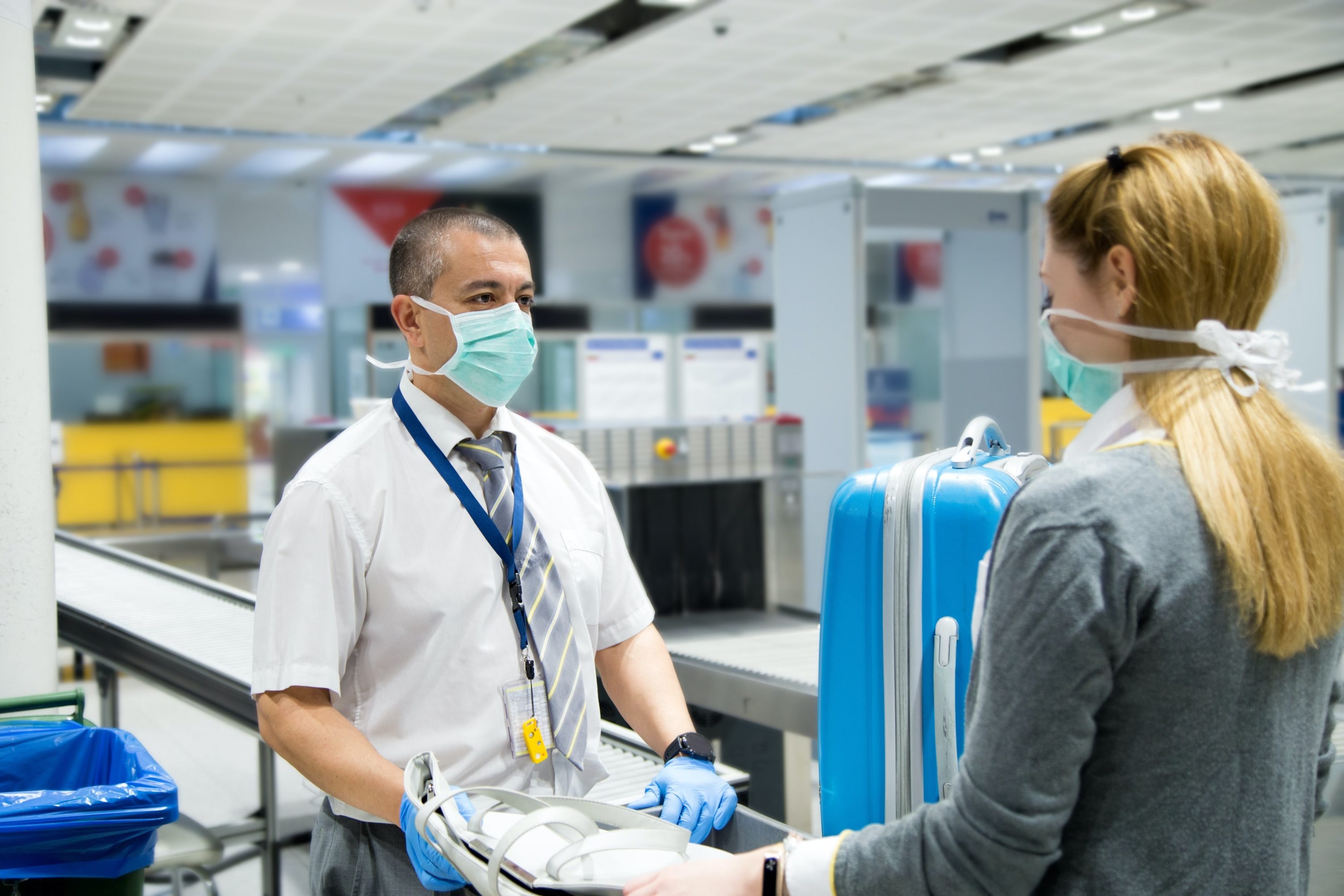Digital Health Passports
what they are, how they work and why they could unlock business travel watch the overview video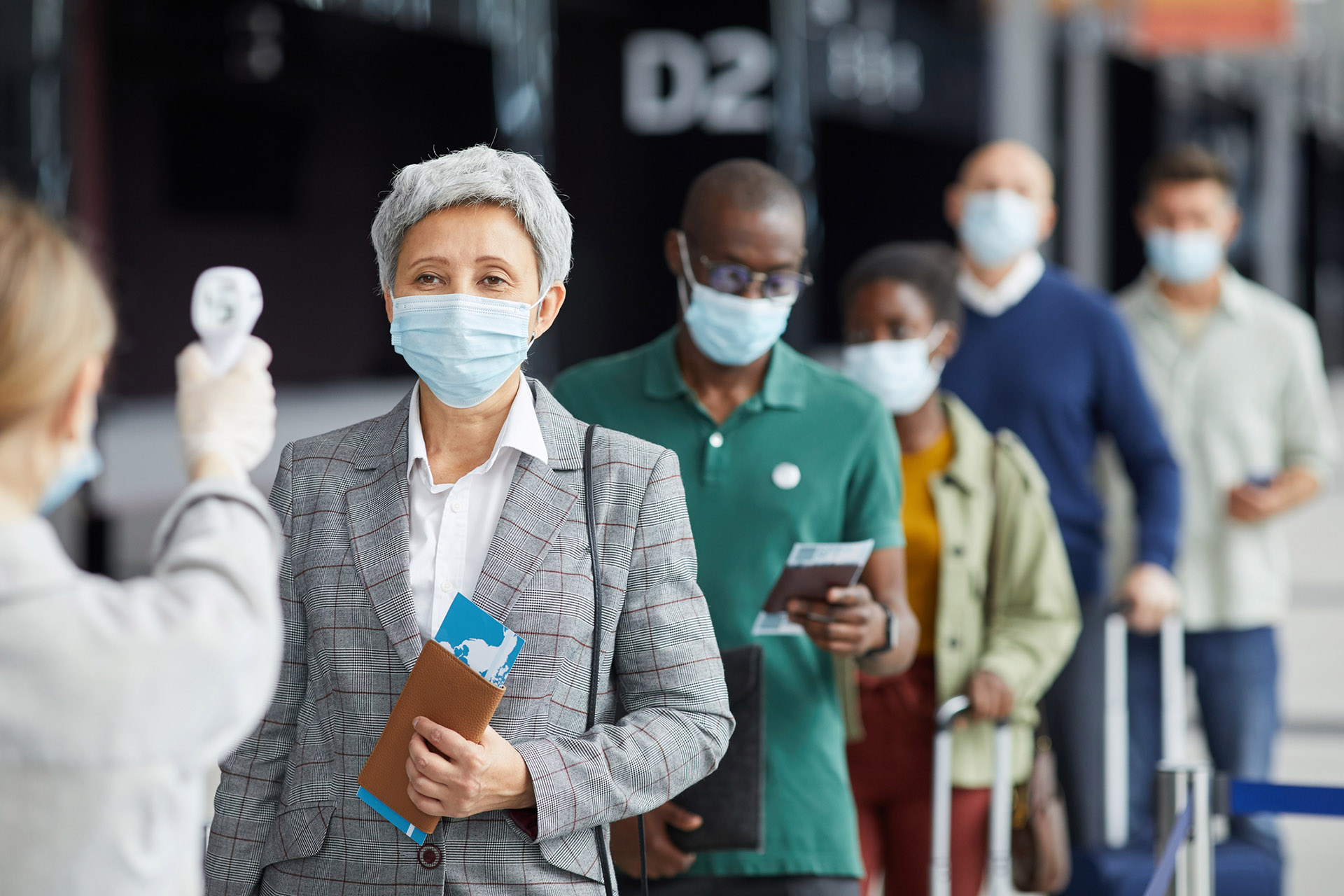
Across the world, governments are examining digital health passport schemes which many expect to become widespread in the next few months if one or more of the vaccines currently being distributed proves effective against transmission of COVID-19.
Several countries already have firm plans to launch vaccine passports while others within the European Union are lobbying for their inclusion within the bloc.
Moreover, commercial companies such as airlines and event organisers are considering making proof of vaccination a condition of being able to enter in much the same way as many now insist on a negative test as a condition.
In this article, Aman Pourkarimi, Consulting Manager at Gray Dawes Group, discusses what Digital Health Passports are, why there is a market for them, who is providing them and whether they are, as many predict, the silver bullet for unlocking travel restrictions.
Current State of Play
Before we get into Digital Health Passports, lets remind ourselves lets current landscape which will explain why there is an opportunity for them.
At the time of writing, there are currently over 22m active cases of COVID-19 globally. That’s a rise of 16% in the first month of 2021 alone and although we saw a decline of 5% within the first 3 weeks of February, there is still currently 2m more active cases than at any point in 2020.
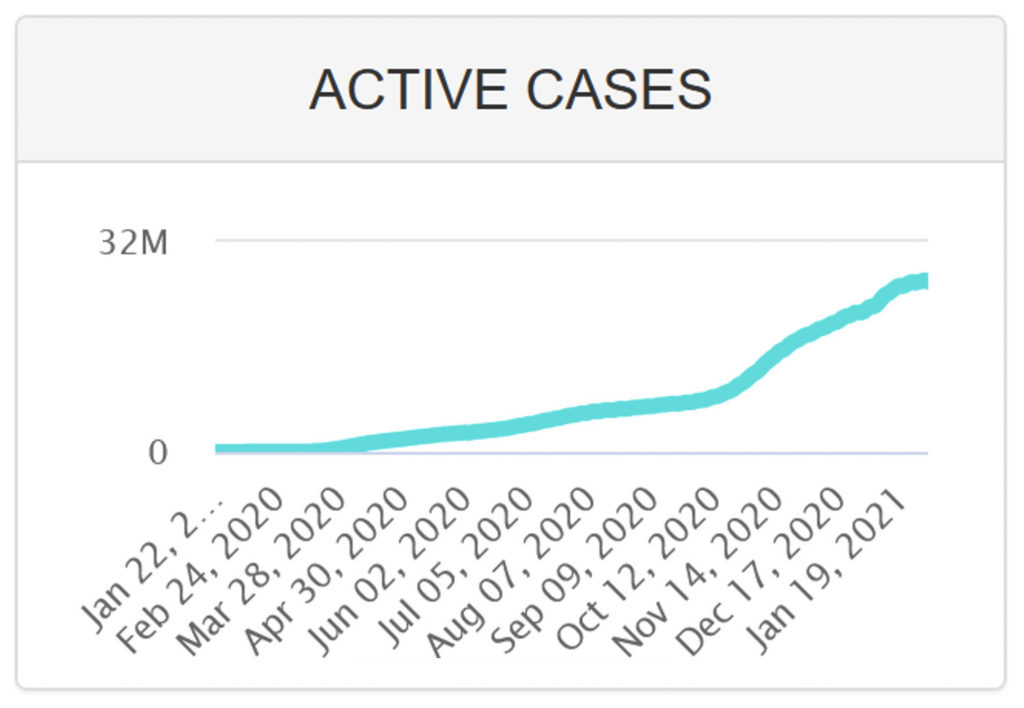
Travel Restrictions
The rise of infections levels and the presence of new variants threatening to destabilise immunisation programmes means restrictions are getting tighter in 2021. 4 in every 5 countries have some sort of border restriction in place, with 51 nations currently banning any inbound visitors not related to critical services.
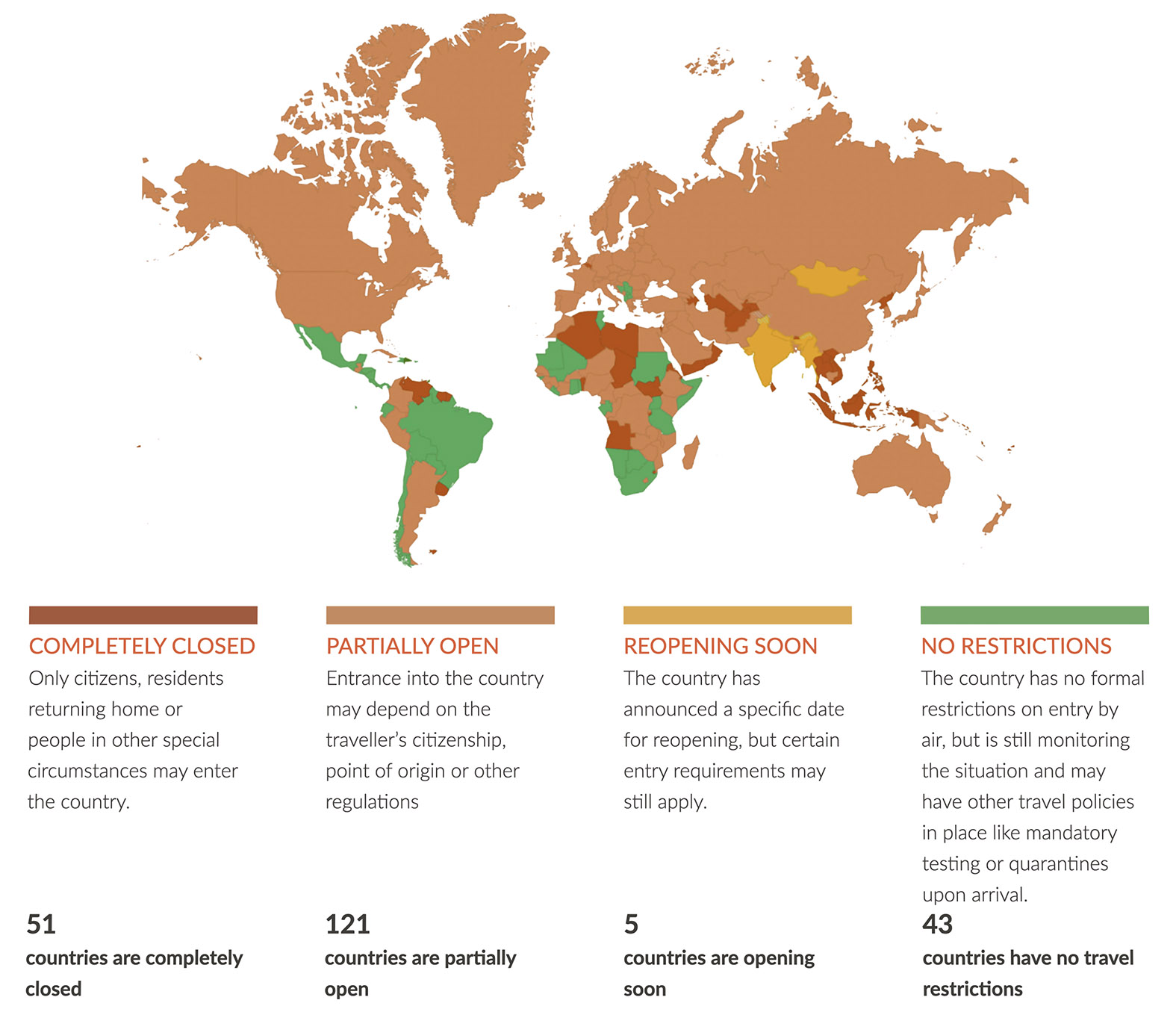
In early January, the UK announced the removal of all travel corridors, replaced by mandatory pre arrival testing for all. The UK will adopt yet further restrictions on the 15th February with managed hotel quarantine for entrants from 33 countries.
Herd Immunity
Anthony Fauci, the top infectious-disease official in the U.S., has said that vaccinating 70% to 85% of a national population would enable a return to normalcy. Yet only China, the US and UK out of the top 10 global economies are on track to achieve this through vaccinations in 2021, with delays over supply in the EU bloc a primary concern.
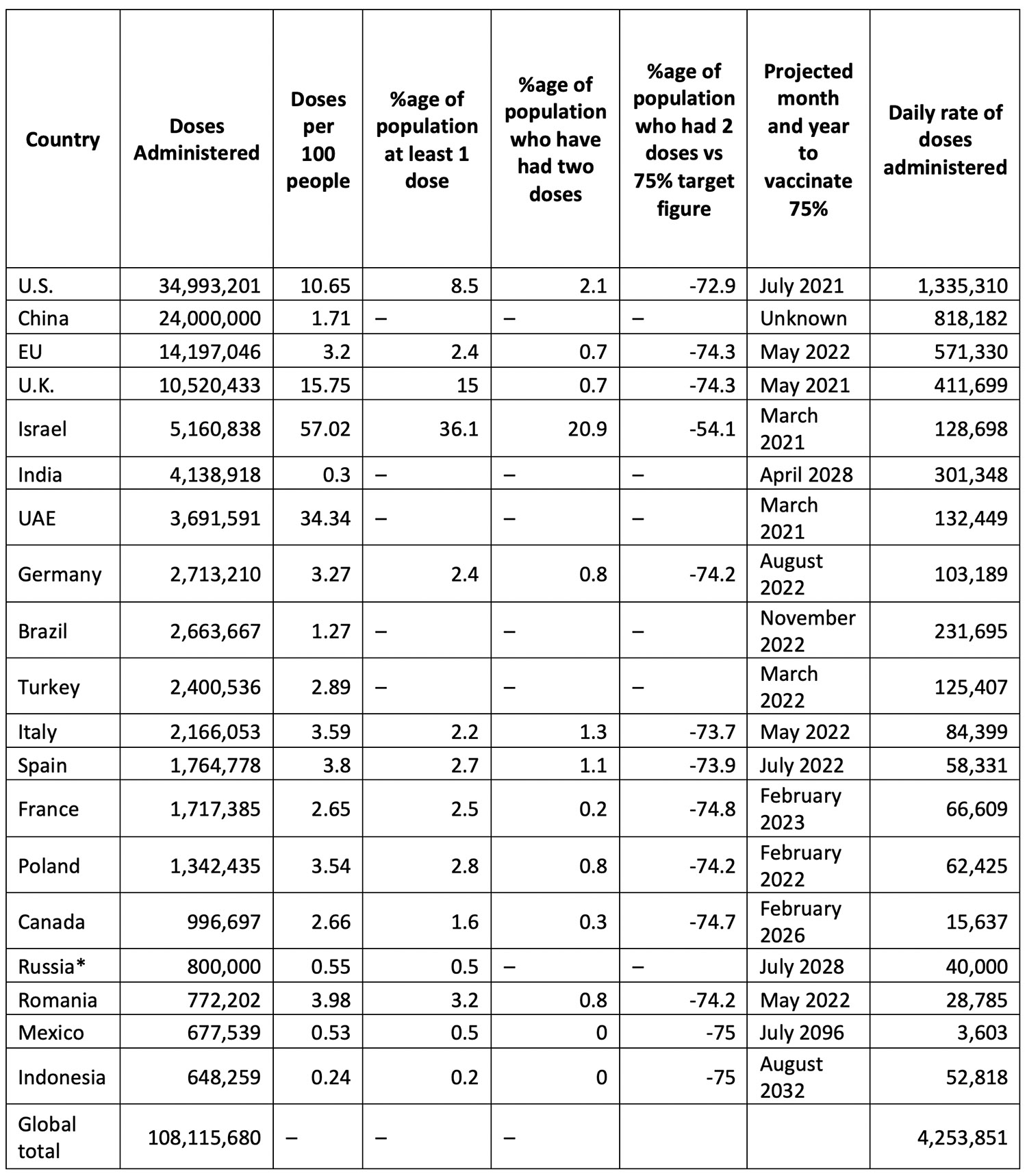
Therefore, we’re likely to be living with COVID-19, testing for years to come. Currently, there are 160 countries which require a COVID-19 test pre-arrival. Yet no two nations have the same process which has caused chaos at airports even with passengers at one tenth of normal levels. Currently border control staff must review and authenticate COVID-19 test results which are supplied from an array of providers, often in different languages and formats and cross check these against the individual country’s requirement. This process is open to human error and counterfeiting.
In addition, a negative test which costs anything between £80-£300 to take with no guarantee of a negative result, does not provide an exemption to quarantine. Travellers face between 10-16 days quarantine and in some cases within a managed facility with further costs (between £800-£1,500,) to gain entry.
As seen the STR’s analysis of UK hotels occupancy levels; demand dropped by as much as 80% in the aftermath of all three lockdowns to date.
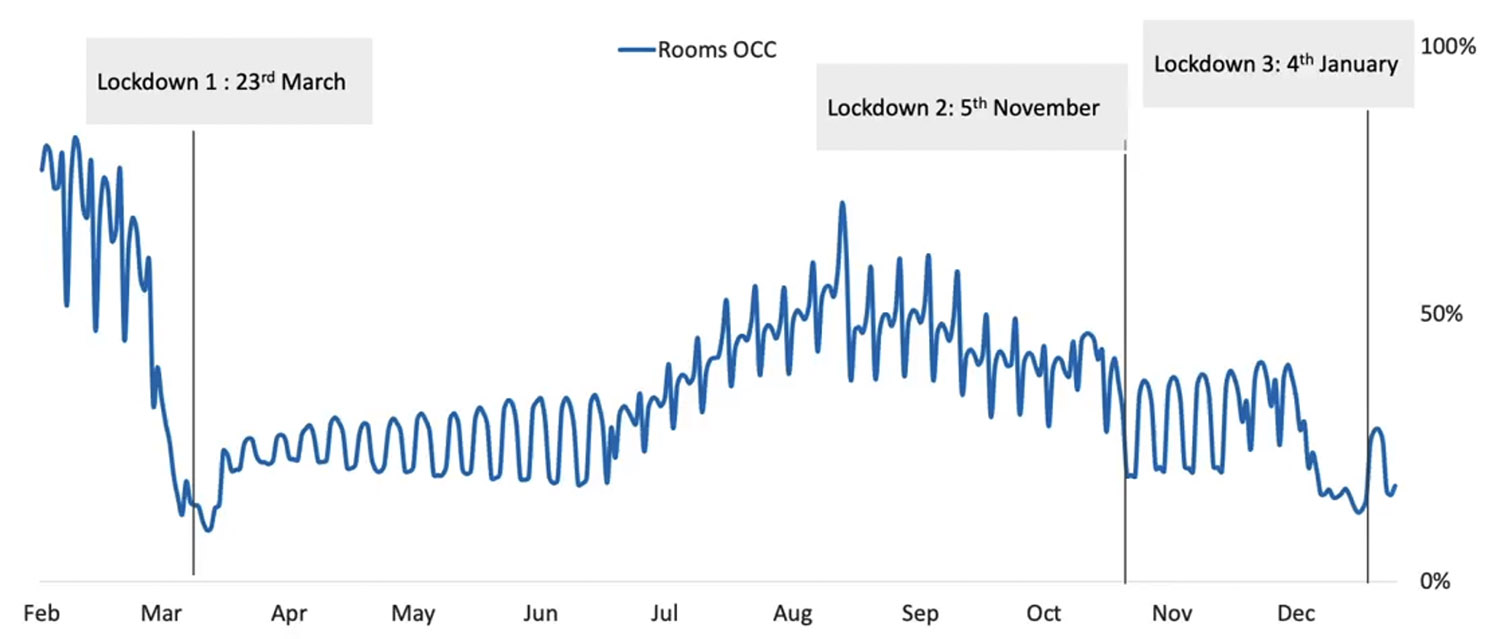
The Economic Importance of Travel
The UK received 41 million visitors in 2019, contributing £28 billion to the economy. This increases to £53bn from 164m visits when domestic trips are included, contributing to the employment of 3.4m directly. While, more broadly, the global travel industry contributes 2.4trillon to the global GDP, sustaining 330m jobs. Therefore, it is absolutely in all governments interest, home and abroad, to lay out, and action, a swift exit policy to prohibitive border restrictions.

What Are Digital Passports?
A digital health passport displays an authenticated COVID-19 test result or vaccination record for an individual. A traveller downloads an app on their smartphone, they either connect that app with their travel provider or upload their itinerary, and the app provides guidance for what verifications they need to travel. Once those steps are met, say getting a negative Covid-19 test at a certified testing centre, and the results are accepted, the traveller will receive a QR code, or other proof, verifying they are safe to fly.
Who’s developing it and who is planning on using them?
The first of which was created in April by Emirates Airlines which set up a testing facility at Dubai airport with passengers provided a code for negative test results, allowing them to board the plane.
There are now at least seven different companies with solutions. The most prominent are International Air Transport Association (IATA) Travel Pass, British Airways’ VeriFly and The World Economic Forum’s CommonPass, which is leading the way with over 30 Governments signed up for trials of its use.
So far, governments in Eastern European such as Poland and Romania Georgia, are the most vocal and active in their plans to introduce “vaccination passports” as a means for visitors to avoid quarantine. Tourism reliant countries such as Denmark, Spain, Greece, Cyprus and Thailand are all keen to implement this ahead of the summer with proposals debated at an EU summit in January.
Spanish Minister of Industry, Trade and Tourism, Reyes Maroto is backing the proposed vaccination passport.
“It is good news as a sign of multilateral commitment. It could contribute to restoring mobility at European level,” said the minister at the meeting of the Executive Council of the World Tourism Organisation (UNWTO) in January 2021
The UK is currently funding eight schemes of such technology, reportedly as a requirement for outbound travellers to be permitted depart to banned countries, at a minimum.
The take up is not limited to governments or travel. Aside from Qantas Airlines announcing they intend to require proof of vaccinations to board their planes, Ticketmaster are building their own app to help revive the live events industry. Therefore, it’s not hard to envisage vaccination passports overtaking face masks as a requirement to enter other privately owned spaces.
What are the Benefits?
- It will replace restrictions such as quarantine which is the biggest barrier to reigniting an industry an industry contributes 10% of global GDP
- A registry of health requirements enables passengers to find accurate information on the testing and eventually vaccine requirements for their journey.
- They can also determine if the traveller’s test type and timing are appropriate to the itinerary.
- They have a registry of testing and vaccination centre so passengers can find labs that meet the requirements of the destination government.
- the system has the consumer-facing app, so travellers can store a digital version of their passport and test results. Travelers can share those results with the airline and authorities via a QR code, a technology already in use with bordering passes
- Travel management companies have existing capability to safely embed the data into their platforms. For example, IATA’s Travel Pass is built it on top of existing IATA solutions including Timatic, a product used by airlines and travel agents for more than 50 years to verify passenger travel documents
- Renowned tech companies such as Microsoft and Oracle are working with the non-profit Mayo Clinic, to create a Vaccination Credential Initiative, to establish standards which authentic vaccination and test results via these passports. This will bring greater confidence in the delivery of what still is an incredibly complex process of implementing this globally
- This technology can also store re-vaccinations for COVID-19 and other inoculations required for entry into some countries, such as malaria and eventually even visas could be loaded onto the platform and provide the same benefits as above.
What are the Issues?
- Acceptance of digital health passports is limited. Aruba is the only country to officially sign on to a platform, opting for CommonPass.
- With lack of equilibrium globally, there’s potentially a class system created if only those vaccinated could travel.
- It will penalise people who cannot be vaccinated for medical reasons and dot wish to be
- Insufficient testing capacity. Currently the UK have listed 200 suppliers for approved testing. This has already struggled at times to cope with surges in demand
- There is a risk Digital Health Passports could be ripe for data privacy and counterfeit breaches. A QR code along can easily be screenshotted. Certificates would need to be linked to names, passport numbers etc that display on vendors end.
- As with the increased security measures from 9/11 which cost airlines and airports billions to adopt, integrated these apps will incur additional costs. The mechanisms, QR codes and API feeds which connect live data from separate sources, are already established.
- Testing and vaccines aren’t for everyone. One in four travellers surveyed would not be willing to take a COVID-19 test prior to departure while less than 50% of the population in countries such as S.Africa, Russia and France intend to take the vaccine.
In Conclusion…
The technology is gaining traction with airlines and governments and it feels inevitable Global Health Passports will be widely adopted by 2022.
With the unequal rate of vaccine delivery, while also accepting not everyone can or will want to be inoculated, Digital Health Passports should include a hybrid, accepting either tests or proof of vaccination in order to garner take up in Global Health Passports.
If they do, as planned, replace quarantine restrictions to those who possess them, a return to pre-COVID-19 freedoms will surely entice many travellers. In addition, vaccine passports could be used for much more than just international travel and could enable people to gain entry to theatres, the cinema and restaurants.
When critiquing a new solution, it is important to compare it against what is currently in place. With new variants, the virus is going to be present for the foreseeable future.
Consequently, a mixture of testing and vaccinations are required to unlock many of the activities currently prohibited. In most countries, such as the UK, vaccinations and test results are paper based. One of the challenges with this method is the time it takes for agents to verify the tests against the proliferation of fake tests entering the market.
Despite airlines currently carrying only 5 to 10% of their pre COVID-19 passenger numbers, they require 100% of their check-in agents working to verify those passengers’ test results. That is not sustainable. The main feature of Digital Health Passport is a mobile app that helps travellers to store and manage their verified certifications for COVID-19 tests or COVID-19 vaccines; it also provides more security and efficiency than paper processes.
Therefore, using the electronic version and using the verifiable credential airlines can push all of this off airport, so passengers arrive completely documented and dramatically reduce delays ahead of what is likely to be a busy summer of released pent up demand.
Gray Dawes Consulting is an impartial, in-house team of experienced travel data experts who combine 90 years’ experience, market-leading tools and analytics to drive corporate travel booking efficiencies, cost savings and traveller satisfaction.
Adopting a tried and tested methodology of 28 Key Performance Indicators, the work of Consulting Manager, Aman Pourkarimi, and his team typically saves clients an average of 22% on their annual business travel spend. We are the first travel management company to offer a unique service which specialises in the SME / Mid Market space.
For a free consultation and to discuss your own travel policy planning, please get in touch.
To help you navigate the changes of business travel, we’ve created the brand-new Traveller Toolkit. This invaluable online resource is packed full of easy-to-use guides and checklists for every stage of every journey. We detail exactly what you need to know and do before, during and after your trip.
You’ll also find innovative and interactive virtual trips, which walk you through each step of being at the airport, on the train and in the hotel. You can even check the travel restrictions and health status of your destination with our comprehensive COVID-19 Country Tracker, updated five times daily to ensure you have the very latest information to help keep you and your travellers safe.
Travel is changing. But with common sense and a good TMC behind you, travellers should have the confidence to once again take to the skies. It’ll soon be business as (un)usual.


